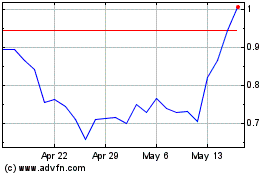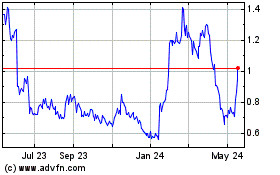Vaxart, Inc. (Nasdaq: VXRT) announced today that it received a
project award valued at up to $453 million through the Rapid
Response Partnership Vehicle (RRPV). The RRPV is a Consortium
funded by the Biomedical Advanced Research and Development
Authority (BARDA), part of the Administration for Strategic
Preparedness and Response (ASPR) in the U.S. Department of Health
and Human Services (HHS).
The funds will be used to conduct a Phase 2b
comparative study evaluating Vaxart’s oral pill COVID-19 vaccine
candidate against a U.S. Food and Drug Administration
(FDA)-approved mRNA vaccine comparator. In preparation for the
trial, Vaxart created and manufactured under Good Manufacturing
Practice (GMP) standards a next-generation oral COVID-19 vaccine
tablet candidate that — based on preclinical data — is more potent
than Vaxart’s prior COVID-19 vaccine constructs.
Funding under the award will be provided in two
parts with approximately $65.7 million available immediately to
continue study start-up activities, and the remainder of
approximately $387.2 million provided when Vaxart and BARDA have
determined that the study may further proceed and paid over the
course of the study. Currently, Vaxart anticipates initiating
enrollment as early as summer 2024. An interim analysis for vaccine
efficacy compared to an approved mRNA comparator may occur as early
as the first quarter of 2025.
“We are grateful to BARDA for this funding,
which will enable Vaxart to conduct a Phase 2b trial for our
COVID-19 oral pill vaccine candidate. This trial will evaluate
whether our oral pill vaccine candidate compares favorably against
an approved mRNA injectable vaccine,” said Dr. James F. Cummings,
Vaxart’s Chief Medical Officer. “We are excited to explore the
results of this head-to-head comparison. Previous research showed
that our earlier COVID-19 vaccine constructs triggered long-lasting
immune responses and induced a cross-reactive immunogenic response
against all tested SARS-CoV-2 variants.”
“Vaccine delivery has relied primarily on
injection for more than 150 years. This funding from BARDA will
assist us in determining whether we can bring a transformational,
next-generation approach to global vaccination,” said Steven Lo,
Vaxart’s Chief Executive Officer. “We believe our oral pill vaccine
platform can better meet societal needs not just for COVID-19,
which is now in the endemic phase, but for other infectious
diseases that present significant endemic and pandemic
threats.”
Vaxart was the first U.S. company to complete a
Phase 2 clinical trial of an oral vaccine for COVID-19. In earlier
clinical trials, Vaxart demonstrated its COVID-19 vaccine
candidates generated robust cross-reactive mucosal IgA responses,
boosted immune responses to existing COVID-19 vaccines, increased
neutralizing antibodies against Omicron 4/5, and had a benign
tolerability profile.
Funding for this award was received under
Project NextGen, a $5 billion initiative by HHS to develop new,
innovative vaccines and therapeutics that provide broader and more
durable protection against COVID-19 than the first generation
COVID-19 vaccines and medicines. This project has been funded with
federal funds from HHS; ASPR; BARDA, under Other Transaction (OT)
number 75A50123D00005.
About the COVID-19 Phase 2b
Trial
The Phase 2b trial is a double-blind,
multi-center, randomized, comparator-controlled study to determine
the relative efficacy, safety, and immunogenicity of Vaxart’s oral
pill COVID-19 vaccine candidate against an approved mRNA COVID-19
injectable vaccine in adults previously immunized against COVID-19
infection. The study design anticipates enrolling approximately
10,000 healthy adults 18 years and older in the United States with
5,000 receiving Vaxart’s COVID-19 vaccine candidate and 5,000
receiving an approved mRNA comparator. At least 25% of the
participants should be at least 65 years old.
The study will measure efficacy for symptomatic
and asymptomatic disease, systemic and mucosal immune induction,
and the incidence of adverse events. The primary endpoint is
relative efficacy of Vaxart’s COVID-19 vaccine candidate compared
to an approved mRNA comparator for the prevention of symptomatic
disease. Primary efficacy analysis will be performed when all
participants have either discontinued or completed a study visit 12
months post-vaccination.
An independent Data and Safety Monitoring Board
(DSMB) will review safety data of the participants.
Execution of this Phase 2b study will be funded
by BARDA through the RRPV.
About Vaxart Vaxart is a
clinical-stage biotechnology company developing a range of oral
recombinant vaccines based on its proprietary delivery platform.
Vaxart vaccines are designed to be administered using pills that
can be stored and shipped without refrigeration and eliminate the
risk of needle-stick injury. Vaxart believes that its proprietary
pill vaccine delivery platform is suitable to deliver recombinant
vaccines, positioning the company to develop oral versions of
currently marketed vaccines and to design recombinant vaccines for
new indications. Vaxart’s development programs currently include
pill vaccines designed to protect against coronavirus, norovirus
and influenza, as well as a therapeutic vaccine for human
papillomavirus (HPV), Vaxart’s first immune-oncology indication.
Vaxart has filed broad domestic and international patent
applications covering its proprietary technology and creations for
oral vaccination using adenovirus and TLR3 agonists.
Note Regarding Forward-Looking
Statements This press release contains
forward-looking statements that involve substantial risks and
uncertainties. All statements, other than statements of historical
facts, included in this press release regarding Vaxart's strategy,
prospects, plans and objectives, receipt of funding from BARDA for
the Phase 2b study, results from preclinical and clinical trials
and the timing of such trials and results, commercialization
agreements and licenses, and beliefs and expectations of management
are forward-looking statements. These forward-looking statements
may be accompanied by such words as "should," "believe," "could,"
"potential," "will," "expected," “anticipate,” "plan," and other
words and terms of similar meaning. Examples of such statements
include, but are not limited to, statements relating to Vaxart’s
receipt of funding from BARDA for the Phase 2b study (or for any
other purpose), Vaxart's ability to develop and commercialize its
product candidates, including its vaccine booster products;
Vaxart's expectations regarding clinical results and trial data,
and the timing of receiving and reporting such clinical results and
trial data; Vaxart’s expectations regarding timing of enrollment in
studies; and Vaxart's expectations with respect to the
effectiveness of its product candidates. Vaxart may not actually
achieve the plans, carry out the intentions, or meet the
expectations or projections disclosed in the forward-looking
statements, and you should not place undue reliance on these
forward-looking statements. Actual results or events could differ
materially from the plans, intentions, expectations, and
projections disclosed in the forward-looking statements. Various
important factors could cause actual results or events to differ
materially from the forward-looking statements that Vaxart makes,
including uncertainties inherent in research and development,
including the ability to meet anticipated clinical endpoints,
commencement, and/or completion dates for clinical trials,
regulatory submission dates, regulatory approval dates, and/or
launch dates, as well as the possibility of unfavorable new
clinical data and further analyses of existing clinical data; the
risk that clinical trial data are subject to differing
interpretations and assessments by regulatory authorities; whether
regulatory authorities will be satisfied with the design of and
results from the clinical studies; decisions by regulatory
authorities impacting labeling, manufacturing processes, and safety
that could affect the availability or commercial potential of any
product candidate, including the possibility that Vaxart's product
candidates may not be approved by the FDA or non-U.S. regulatory
authorities; that, even if approved by the FDA or non-U.S.
regulatory authorities, Vaxart's product candidates may not achieve
broad market acceptance; that a Vaxart collaborator may not attain
development and commercial milestones; that Vaxart or its partners
may experience manufacturing issues and delays due to events
within, or outside of, Vaxart's or its partners' control;
difficulties in production, particularly in scaling up initial
production, including difficulties with production costs and
yields, quality control, including stability of the product
candidate and quality assurance testing, shortages of qualified
personnel or key raw materials, and compliance with strictly
enforced federal, state, and foreign regulations; that Vaxart may
not be able to obtain, maintain, and enforce necessary patent and
other intellectual property protection; that Vaxart's capital
resources may be inadequate; Vaxart's ability to resolve pending
legal matters; Vaxart's ability to obtain sufficient capital to
fund its operations on terms acceptable to Vaxart, if at all; the
impact of government healthcare proposals and policies; competitive
factors; and other risks described in the "Risk Factors" sections
of Vaxart's Quarterly and Annual Reports filed with the SEC. Vaxart
does not assume any obligation to update any forward-looking
statements, except as required by law.
Contacts
| Vaxart Media
Relations: |
Investor
Relations: |
| Mark Herr |
Andrew Blazier |
| Vaxart, Inc. |
FINN Partners |
| mherr@vaxart.com |
IR@vaxart.com |
| (203) 517-8957 |
|
Vaxart (NASDAQ:VXRT)
Historical Stock Chart
From Dec 2024 to Jan 2025

Vaxart (NASDAQ:VXRT)
Historical Stock Chart
From Jan 2024 to Jan 2025
